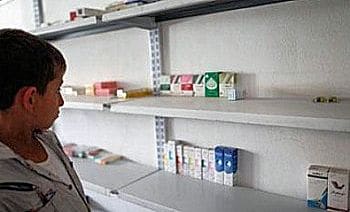The complaint of Fedefarma Lazio and its president Franco Caprino dates back to four years ago. Medicines intended for the Italian market cannot be found as they feed a parallel foreign market.
Some national newspapers took care of it but, as often happens with serious news concerning our country, the curtain also came down on this serious criminal act which, while filling the pockets of unscrupulous criminals, destroys the health of thousands of citizens.
The situation is now starting to be unsustainable and has become a real emergency. Medicines intended for the Italian market are purchased by wholesalers but also by pharmacists and sold abroad with prices increased by 300%. The same Fedefarma stated that the Mirapexin 2.1 for the treatment of disease Parkinsons which can be purchased in Italy at the price of 53.10 euros, in Germany it is sold for 275.10 euros. The revenues are exorbitant and the consequence is that the drug in Italy becomes almost
Given that the rules on the free market make this system paradoxically legitimate, it is essential that citizens have all the rights to access medicines that can save their lives. It is true that, according to Legislative Decree no. 219 of 2006 in article 105 paragraph 4, there is the possibility of requesting the drug directly from the manufacturer who is obliged to supply it within 48 hours. Unfortunately, in reality it is not such a simple practice and often the patient is left without medicine or is forced to adapt to a temporary replacement treatment which does nothing but worsen his health conditions.
The question I ask myself in the face of paradoxical situations like this is always the same: why is there no European law that regulates the sale of essential medicines? And why, in the light of so many complaints, has no authority ever intervened? Perhaps because the health of a human being is worth less than the bribes of the various cronies?
Alina DiMattia
Related news: Shortcomings protocol, Lazio Tar rejects the appeal
AIFA. List of missing medicines
AIFA. Carenza”Tubertest, derivato proteico purificato della tubercolina”
AIFA. Carenza “fludrocortisone acetato”
AIFA. Aggiornamenti relativi alla carenza del medicinale “Busilvex®”
AIFA. The phenomenon of Deficiencies and monitoring activities
See also:
Drug shortage. NAS checks are back between distributors
Drug shortage. Question by Vargiu (Sc) on parallel exports: "Lorenzin intervene"
Medicines shortage: let's transform them from a cost into a resource for the Health Service
Drug shortages, from Altroconsumo handbook with indications and advice
Pharmacists-wholesalers, Di Giorgio (A
shortages and unavailability
The phenomenon of Deficiencies and monitoring activities
The temporary unavailability on the national market of medicines essential for the treatment of certain pathologies is monitored by AIFA on the basis of an ad hoc procedure.
By "lacking" we mean a medicinal product that is not available throughout the national territory, as the MA holder is temporarily unable to ensure an appropriate and continuous supply.
The shortage of a drug on the market can be determined by various factors, including, for example, the unavailability of the active ingredient, problems related to production, regulatory measures, an unexpected increase in requests for a specific drug, or health emergencies in the producing countries.
The real shortage of a medicine must be distinguished from its momentary unavailability caused by distortions of distribution dynamics.
La normativa europea non contiene una definizione armonizzata dei termini “carenza” e “indisponibilità” di farmaci. I due fenomeni si riferiscono di fatto a due situazioni di differente natura:
- le carenze legate a problemi produttivi sono spesso correlate alla non-redditività di farmaci “datati” o di basso costo;
- le indisponibilità generate da distorsioni del mercato sono riconducibili al fenomeno del “parallel trade”, che sfrutta le differenze di prezzo dei farmaci sui diversi mercati.
With regard to reports regarding shortages of medicines sent by the holders AIC, the Product Quality and Combating Pharmaceutical Crime Office proceeds to:
- ascertain the effectiveness and extent of the deficiency;
- evaluate the specific criticalities, verifying:
- the type of deficiency (periodic, recurrent, chronic or newly reported);
- the availability of similar products on the Italian or foreign market or if they are "unique" drugs;
- contact the owner companies AIC of the missing medicinal product, of the analogues and the other interlocutors involved (manufacturers, intermediaries, distributors, importers, structures and health authorities, etc.).
In the light of the assessments made, the Office takes the necessary measures:
- release of the import authorization to the Company holding the marketing authorization for the missing drug;
- release of the authorization (Nulla Osta) to import for each healthcare facility that requests it;
- other specific provisions (e.g. determinations, rationalization of use for certain categories of patients, etc.).
AIFA
